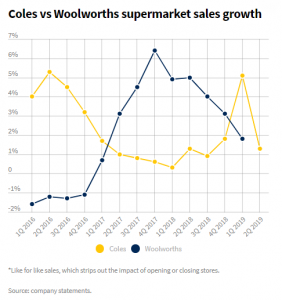Supermarket group Coles’ like-for-like sales growth slowed drastically in the final months of last year, as the sugar hit from its popular Little Shop toy giveaway wore off.
After growing at 5.1 per cent in the first quarter, Coles said on Tuesday that like-for-like supermarket sales growth dropped to 1.3 per cent in the three months to December 30, and that slower momentum had continued into the new year.
Coles’ wildly successful Little Shop collectables campaign, which rewarded shoppers with plastic replicas of popular supermarket items, and its decision to keep giving customers free plastic bags when Woolworths removed them, were credited with its bumper sales growth in the first quarter.
In its first half-year result as a standalone company since being spun out from Wesfarmers in November, Coles reported net profit after tax of $381 million for the six months to December 31 – down 29 per cent from the same period a year earlier.
That fall was driven by a previously announced $146 million provision for redundancies and site closures as spends $950 million building two new automated distribution warehouses, while earnings from its Coles Express service stations plunged as customers fled its high fuel prices.
Coles shares were down about 2 per cent at 11.30am eastern time to $12.35. The stock floated at $12.75 in November when the supermarket was spun out from parent company Wesfarmers.
Coles chief executive Steven Cain said the result was “solid” considering the challenging retail environment, and that the supermarket was laying the foundations for long-term growth.
“We have delivered strong cash generation and we have a robust balance sheet which will enable us to reposition the business in the years ahead,” he said.
Coles’ Express service station business suffered a 39 per cent fall in earnings, as fuel volumes fell another 16 per during the half.
The business has been losing customers because it has the highest fuel prices of any Australian service station chain.
But Coles says this will change under a new alliance agreement with Viva Energy, which supplies the fuel to its 713 Coles Express sites.
Coles said that in supermarkets, larger average basket size was the key driver of sales growth in the half, with total transaction numbers growing by only half a per cent. Trading in the second quarter was affected by bad weather and was particularly weak in NSW.
The supermarket continued its push to increase sales of homebrand products – which hit 29 per cent of total sales in the half, compared to 28.5 per cent a year ago.
Fresh food prices increased 0.5 per cent in the half due to the drought in NSW driving up the cost of baked goods and meat.
Liquor sales, through its Liquorland, First Choice and Vintage Cellars chains, were flat as unfavourable weather hit beer and ready-to-drink sales, and because New Years Eve fell in the second-half rather than in the first.
But earnings were up 7 per cent from productivity gains and improvement in margins from selling more private-label products.
Including discontinued operations, as a result of the demerger, net profit was down 14 per cent to $738 million.
Underlying earnings before interest and tax of $733 million sat within analysts’ forecast of $705 million to $794 million.
Coles, which has promised a shareholder payout ratio of 80 to 90 per cent, said it would not pay a dividend, with its earnings up to November 27 being reflected in Wesfarmers’ first-half dividend.
Extracted from The Sydney Morning Herald
